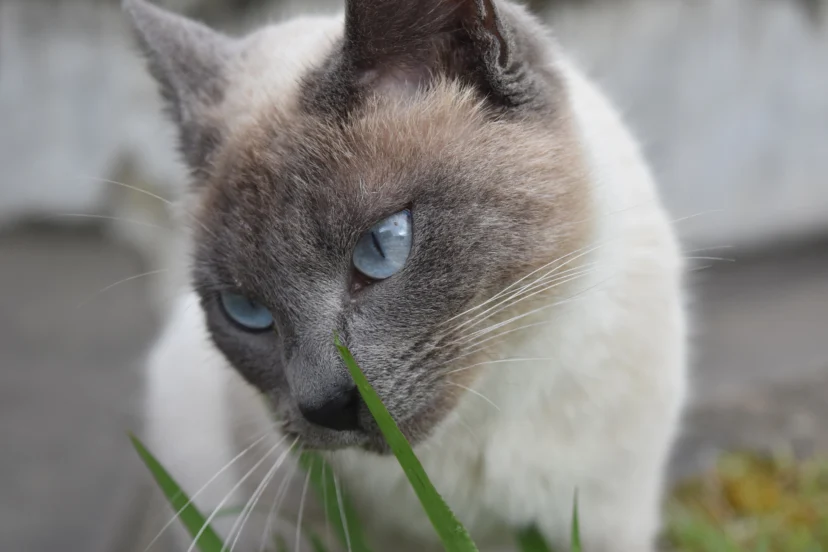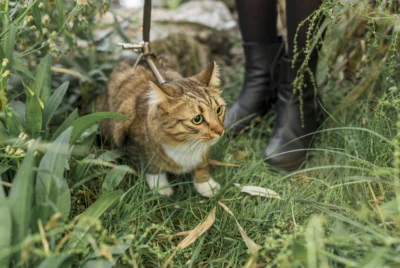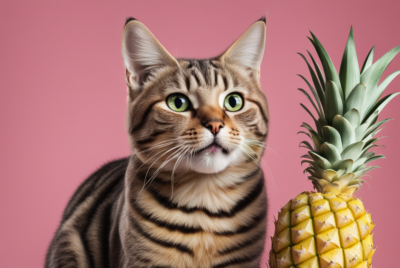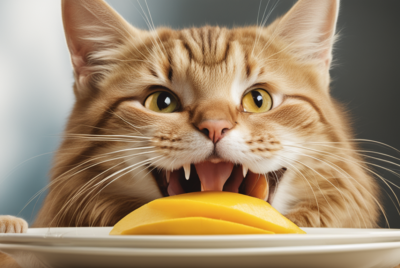Are Siamese Cats Mean? A Guide for New Cat Owners
Siamese cats turn heads with their stunning blue eyes and unique pointed markings. These captivating felines have held a place in many hearts for centuries. However, a rumor follows them: are they unfriendly, even mean?
This misconception can deter potential cat parents from welcoming these intelligent and loving felines into their homes. So, are Siamese cats truly mean? The answer, like most things in the cat world, is a resounding “it depends.”
Debunking the Myth: Are Siamese Cats Aggressive?
Siamese cats are smart and full of life! They love to talk a lot and have big personalities. This can sometimes seem like they’re mad, but they’re just trying to tell you something. Unlike some other cats who are happy to snooze all day, Siamese cats are more active and want to play and cuddle a lot.
This can be confusing for some people who aren’t used to such chatty cats. But once you understand how Siamese cats communicate, you’ll see they’re not grumpy at all, they just have a lot to say!
Understanding Siamese Cat Personality
Siamese cats boast a captivating personality with distinct traits. Their intelligence shines through in their eagerness to learn tricks and their playful nature.
They form strong bonds with their human companions, often seeking constant interaction and affection. Their vocal repertoire is extensive, ranging from meows to chirps and trills, used to communicate their needs and desires.
Highly Vocal: One of the most defining Siamese cat personality traits is their vocal nature, unlike most other cat breeds. They are known for their distinctive meows and a wide range of vocalizations used to express happiness, curiosity, or even frustration. Don’t be surprised if your Siamese cat has a conversation with you!
However, it is good to understand that not all siamese cats are highly vocal. Some siamese cats tend to be silent and not meow a lot.
Attention Seekers: Thriving on human interaction, Siamese cats crave attention and playtime. They may follow you around the house, nudge you for petting, or even vocalize their desire for engagement.
Playful and Energetic: Siamese cats possess a playful and energetic spirit. They enjoy interactive toys, climbing structures like cat trees, and engaging in playful chases. Providing them with a stimulating environment is crucial for their well-being.
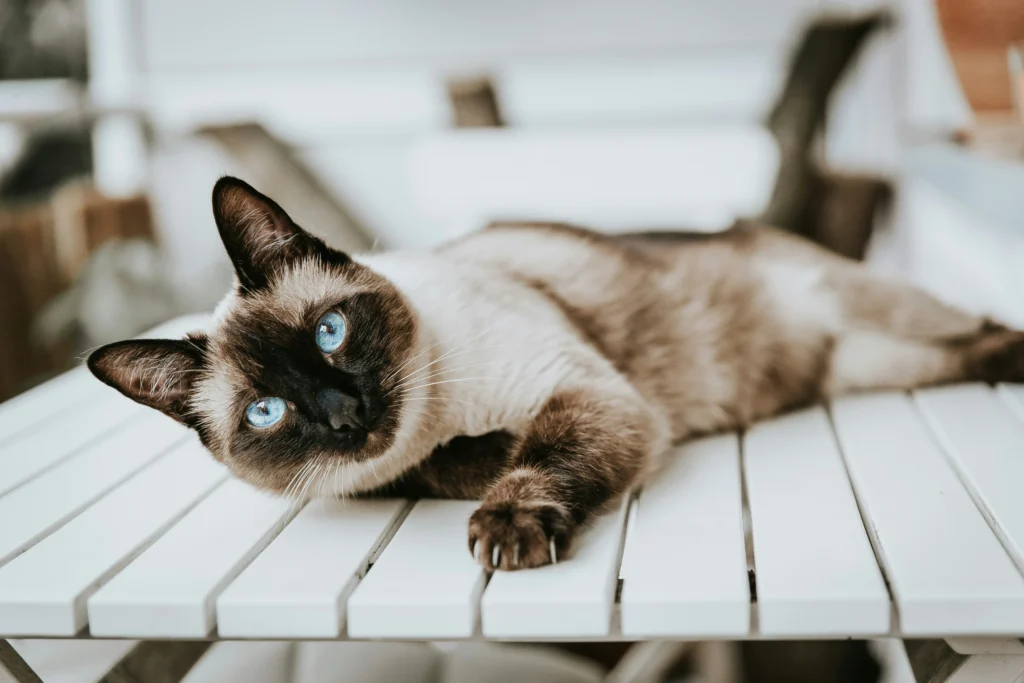
Factors Influencing Siamese Cat Behavior
Siamese cats are full of personality, but sometimes their playful energy can turn into naughty behavior. Here’s what might be causing it and how to make your cat happy again:
Every Cat is Unique: Just like people, Siamese cats all have different personalities. Some are super chatty, some are more low-key, but all of them love attention and playtime!
Feeling Bored or Neglected: If your cat isn’t getting enough playtime, attention, or interesting things to do, they might get frustrated and start acting out. This could mean meowing a lot, scratching furniture, or even seeming aggressive.
Healthy Food, Happy Cat: Just like us, Siamese cats need good food to feel their best. Make sure they’re eating a protein-rich cat food that gives them the energy to play and keeps them from getting cranky.
Skin Twitching and Hissing? Sometimes, Siamese cats get a condition called “feline hyperesthesia syndrome” that makes their skin twitch and meow a lot. If you see this, take your cat to the vet to make sure everything is okay.
Also read: Do Siamese Cats Shed? What You Need to Know
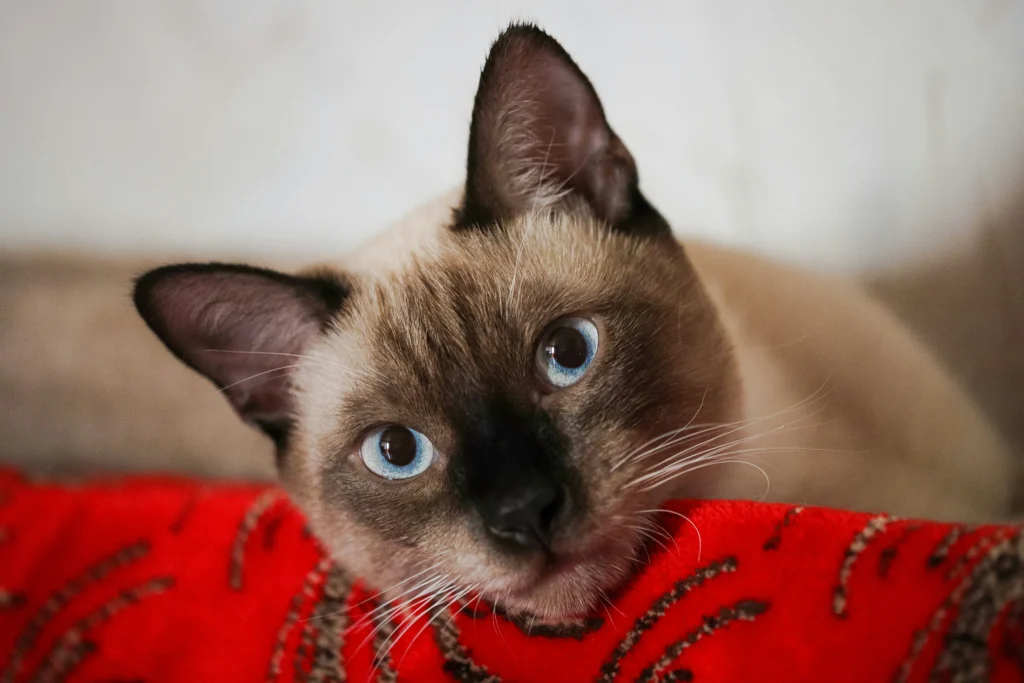
Addressing Aggressive Behavior
While not inherently aggressive, Siamese cats may exhibit behavior that appears that way due to various reasons. Understanding these triggers and implementing positive reinforcement techniques can help prevent such behavior.
Addressing Fear: Loud noises, new pets, or unfamiliar places can make your Siamese cat feel nervous. If they puff up or swat, it’s like saying “I’m scared, please give me some space!”
Creating a Peaceful Multi-Pet Home: Bringing another cat or dog home can be stressful for your Siamese. Take things slow and create a special spot for your Siamese to relax if they need a break.
Managing Competition: Two Siamese cats might want your attention or the same toys. Lots of scratching posts, comfy spots to nap, and playtime for each cat helps everyone get along!
Recognizing True Aggression: This might be a real sign of being upset. If you see this, try to figure out what’s bothering your cat and fix it.
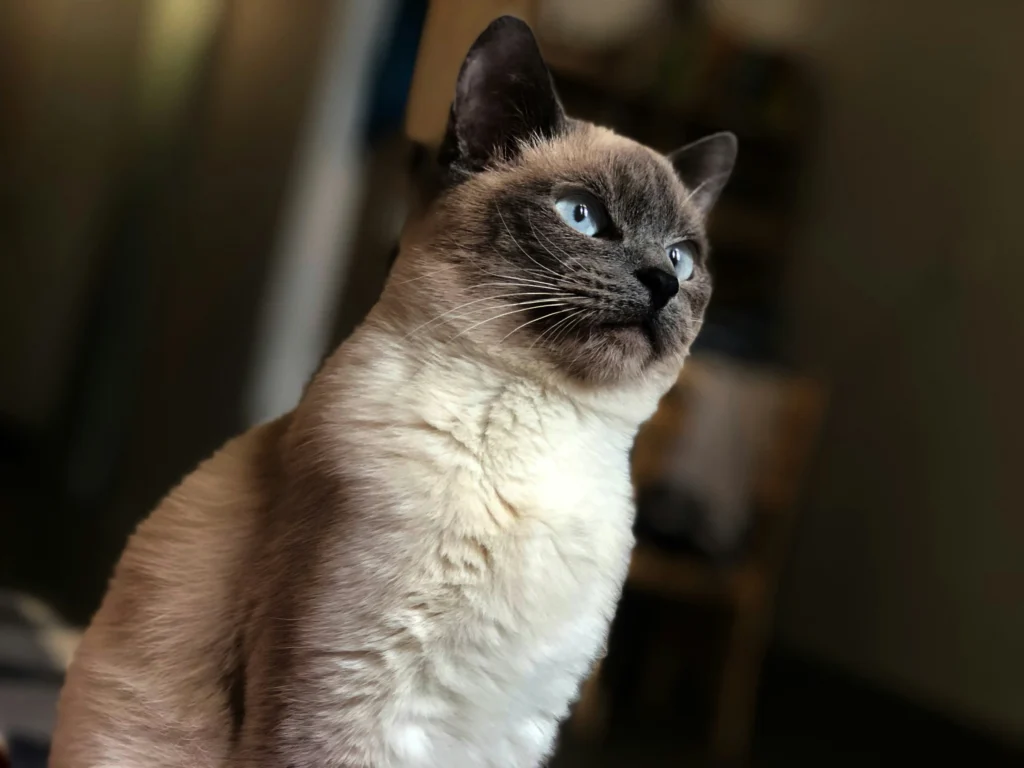
Creating a Happy and Healthy Siamese Cat
Siamese cats are intelligent and full of personality. By providing a fun environment, taking good care of them, and understanding what they like, you can help your cat live a long and happy life. Here are some easy tips:
Playtime Paradise: Siamese cats are natural explorers and love to climb. A cat tree gives them a safe place to climb, watch their surroundings, and scratch (which keeps your furniture safe!). Interactive toys and puzzle feeders keep their minds active and prevent boredom.
Balanced Nutrition: Just like athletes need good food, Siamese cats need protein-rich cat food made for active breeds. Look for food with lots of real meat and healthy fats to keep them healthy and their coat shiny.
Healthy Weight: Siamese cats can easily gain weight if they don’t get enough exercise. Keep an eye on your cat’s weight and adjust their food or choose a special weight management food if they start to get chubby.
A healthy weight keeps their joints happy and helps prevent health problems. You can start by feeding your feline friend high protein cat food as part of weight management. More protein cat food helps maintain just the right amount of animal fat.
Proactive Care for Your Siamese Cat’s Well-Being
Siamese cats, like other cat breeds, are susceptible to certain health conditions. Early detection and proper veterinary care are crucial for maintaining their well-being. Here are some health concerns to be aware of:
Bladder and Kidney Diseases: Siamese cats can sometimes get problems with their bladders and kidneys. To help keep them healthy, make sure they have plenty of fresh water to drink. Special food for urinary health can also be helpful. Regular checkups at the vet are important too! This will help catch any problems early on.
Feline Kneecap Slipping (Patellar Luxation): Some Siamese cats might have a condition where their kneecap pops out of joint. This can make their legs look odd and jumping difficult. If you see this, take your kitty to the vet for a check-up. They can diagnose the problem and recommend treatment.
Early Detection of Pain: Siamese cats might not meow when they’re in pain. Watch for changes in how they act, how much they eat, or how they use the litter box. These changes could be signs of a health problem. Regular vet visits are important to catch any problems early.
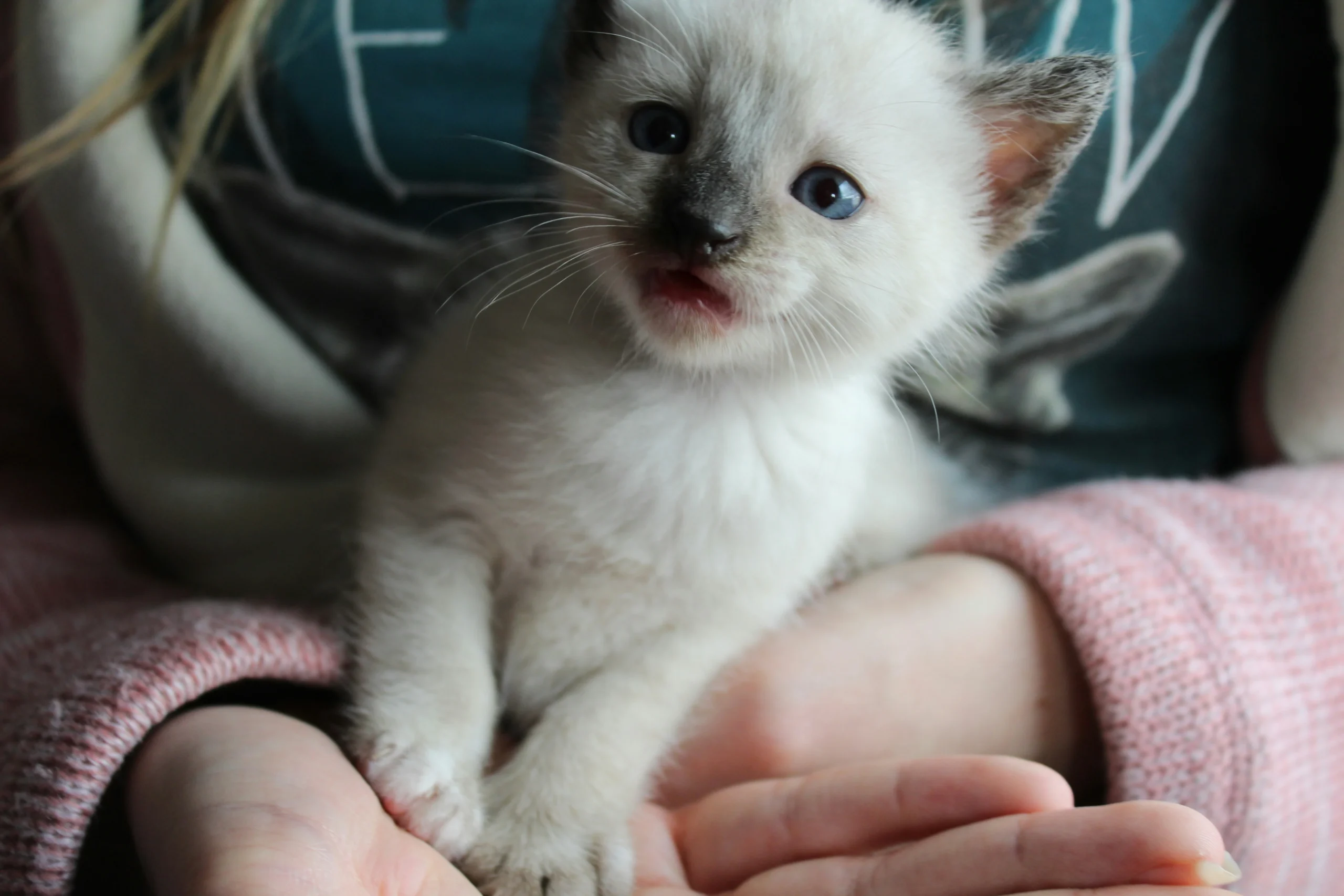
Caring for Your Siamese Cat
Beyond providing food and playtime, proper care is essential for a healthy and happy Siamese cat. Here are some key aspects to consider:
Regular Checkups: Take your Siamese cat to the vet for regular checkups, even if they seem fine. This helps catch any problems early and keeps them up-to-date on shots and worming medicine.
Positive Reinforcement Techniques: Siamese cats respond well to positive reinforcement training. Reward good behavior with treats, praise, or petting. This helps build a strong bond and discourages unwanted behaviors.
Building a Bond: Siamese cats thrive on human interaction. Dedicate time for playtime, petting sessions, and simply talking to your cat. This strengthens your bond and provides them with the attention they crave.
Conclusion
Siamese is a cat breed that is naturally smart, loving, and sure knows how to make themselves heard! Knowing what this breed likes and taking good care of them will make you best friends.
A cat owner must know their siamese cat’s personality. These kitties aren’t mean, but their smarts and need for attention can sometimes be misunderstood. Also, frustrated siamese cats, just like our other pets, tend to be aggressive.
Give them things to play with, keep their check-ups regular, and shower them with love. They’ll reward you with years of friendship and purrs!

